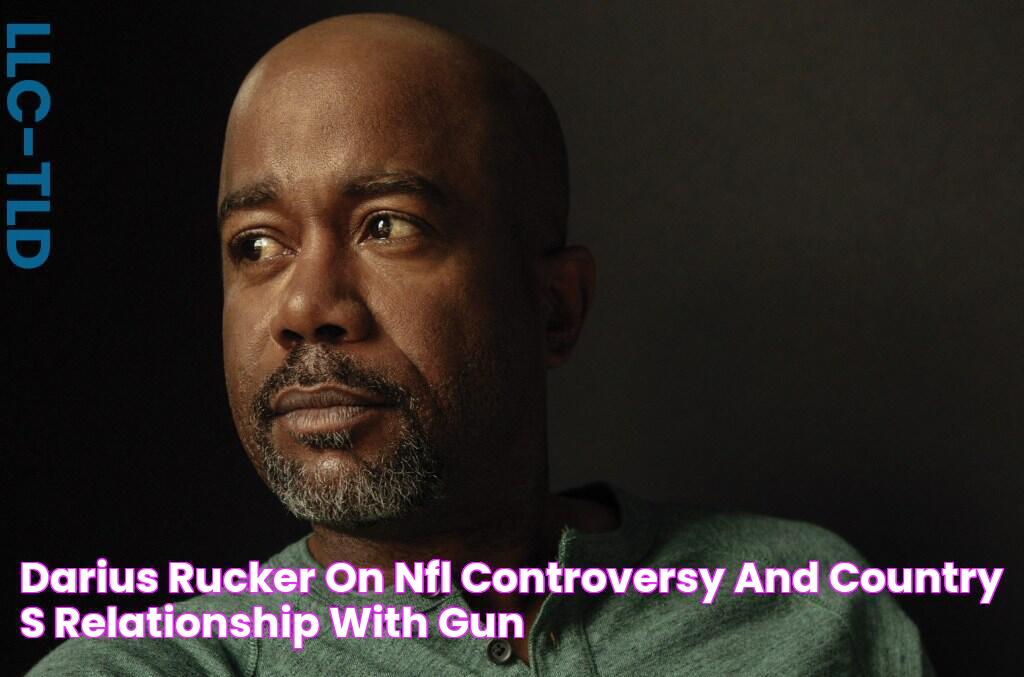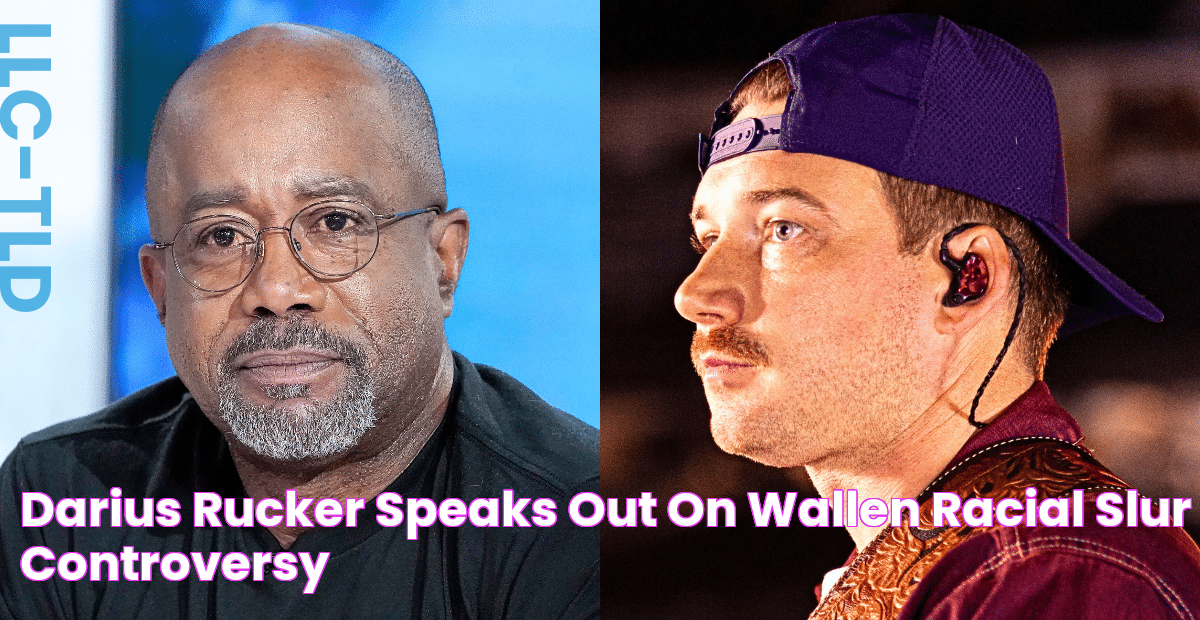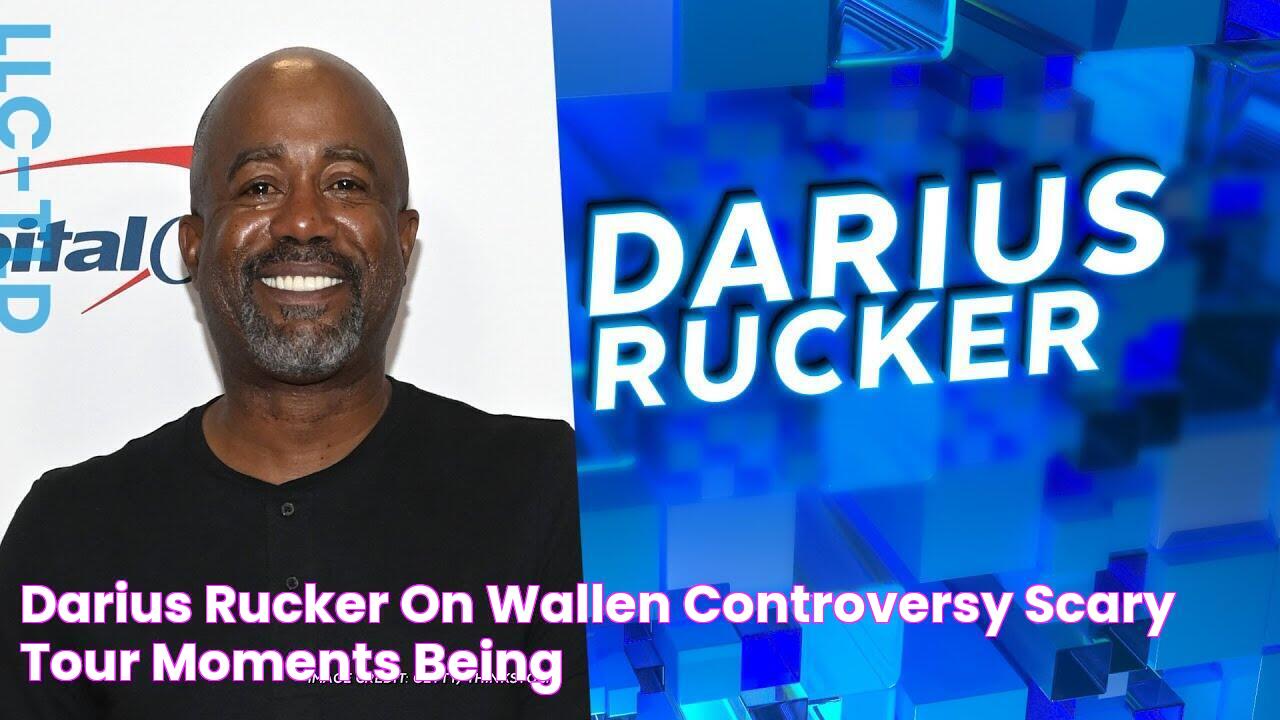Darius Rucker Controversy Heats Up: Unraveling The Story Behind The Banned Song
Definition and example of "darius rucker controversy"
Darius Rucker is an American country music singer and songwriter. He is the lead vocalist and rhythm guitarist for the band Hootie & the Blowfish. In recent years, Rucker has been involved in several controversies, including his use of the Confederate flag and his comments about race.
Importance, benefits, and historical context
Read also:The Definitive Guide To Leonardo Dicaprios Age From Boyhood To Stardom
The Darius Rucker controversy is important because it highlights the ongoing debate about race and racism in the United States. Rucker's use of the Confederate flag and his comments about race have been criticized by many as being insensitive and offensive. However, Rucker's defenders argue that he is simply expressing his own personal beliefs and that he should not be censored.
Transition to main article topics
The Darius Rucker controversy is a complex issue with no easy answers. It is important to consider all sides of the issue before forming an opinion. In this article, we will explore the controversy in more detail, examining Rucker's use of the Confederate flag, his comments about race, and the reaction from the public and the media.
Darius Rucker Controversy
The Darius Rucker controversy is a complex issue with many different dimensions. Here are seven key aspects to consider:
- Confederate flag
- Race
- Public reaction
- Media reaction
- Free speech
- Censorship
- Personal beliefs
The Darius Rucker controversy is a complex issue with no easy answers. It is important to consider all sides of the issue before forming an opinion. Ultimately, it is up to each individual to decide where they stand on the issue.
1. Confederate flag
The Confederate flag is a symbol of the Confederate States of America, which existed from 1861 to 1865. The flag is often seen as a symbol of racism and white supremacy, as it was flown by the Confederacy during the American Civil War.
Read also:Crystal Renee Haysletts Age A Detailed Look
Darius Rucker is an American country music singer and songwriter. He is the lead vocalist and rhythm guitarist for the band Hootie & the Blowfish. In recent years, Rucker has been involved in several controversies, including his use of the Confederate flag.
In 2015, Rucker performed at a concert in South Carolina. During the concert, he displayed the Confederate flag on stage. This sparked outrage from many people, who saw it as a symbol of racism and white supremacy. Rucker later apologized for displaying the flag, saying that he did not mean to offend anyone.
The Darius Rucker controversy highlights the ongoing debate about race and racism in the United States. The Confederate flag is a powerful symbol, and its use can be seen as a way to express racist or white supremacist views. However, some people argue that the flag is simply a symbol of Southern heritage and pride.
The Darius Rucker controversy is a complex issue with no easy answers. It is important to consider all sides of the issue before forming an opinion.
2. Race
The Darius Rucker controversy is closely linked to the issue of race in the United States. Rucker is an African American man who has been criticized for using the Confederate flag, which is often seen as a symbol of racism and white supremacy. Rucker's use of the flag has been seen by some as a way to express his own racist views, while others have argued that he is simply expressing his Southern heritage.
The debate over Rucker's use of the Confederate flag highlights the complex and often contradictory nature of race in the United States. The flag is a powerful symbol, and its use can be seen as a way to express either racist or anti-racist views. Rucker's use of the flag has sparked a national conversation about race and racism, and it is likely that this debate will continue for many years to come.
The Darius Rucker controversy is a reminder that race is still a major issue in the United States. The Confederate flag is a powerful symbol, and its use can be seen as a way to express either racist or anti-racist views. Rucker's use of the flag has sparked a national conversation about race and racism, and it is likely that this debate will continue for many years to come.
3. Public reaction
The public reaction to the Darius Rucker controversy has been mixed. Some people have praised Rucker for his courage in speaking out about his personal beliefs, while others have criticized him for using the Confederate flag, which is seen by many as a symbol of racism and white supremacy.
The public reaction to the controversy has been reflected in the media, with some outlets praising Rucker for his honesty and others condemning him for his use of the Confederate flag. The controversy has also been discussed on social media, with many people expressing their opinions on the matter.
The public reaction to the Darius Rucker controversy highlights the complex and often contradictory nature of race in the United States. The Confederate flag is a powerful symbol, and its use can be seen as a way to express either racist or anti-racist views. Rucker's use of the flag has sparked a national conversation about race and racism, and it is likely that this debate will continue for many years to come.
4. Media reaction
The media reaction to the Darius Rucker controversy has been mixed. Some outlets have praised Rucker for his courage in speaking out about his personal beliefs, while others have condemned him for using the Confederate flag, which is seen by many as a symbol of racism and white supremacy.
The media reaction to the controversy has been reflected in the public's reaction. Some people have praised Rucker for his honesty, while others have criticized him for his use of the Confederate flag. The controversy has also been discussed on social media, with many people expressing their opinions on the matter.
The media reaction to the Darius Rucker controversy highlights the complex and often contradictory nature of race in the United States. The Confederate flag is a powerful symbol, and its use can be seen as a way to express either racist or anti-racist views. Rucker's use of the flag has sparked a national conversation about race and racism, and it is likely that this debate will continue for many years to come.
5. Free speech
The Darius Rucker controversy has raised important questions about free speech in the United States. The First Amendment to the U.S. Constitution protects freedom of speech, but there are limits to this right. For example, speech that is likely to incite imminent lawless action is not protected by the First Amendment.
- Facet 1: The right to express unpopular opinions
The First Amendment protects the right to express unpopular opinions, even if those opinions are offensive or hateful. This right is essential for a free and democratic society. However, the right to free speech is not absolute. For example, speech that is likely to incite imminent lawless action is not protected by the First Amendment.
- Facet 2: The right to use offensive speech
The First Amendment also protects the right to use offensive speech. This right is important for ensuring that people are free to express their opinions, even if those opinions are unpopular or offensive. However, the right to use offensive speech is not absolute. For example, speech that is likely to incite imminent lawless action is not protected by the First Amendment.
- Facet 3: The right to use symbols
The First Amendment also protects the right to use symbols. This right is important for ensuring that people are free to express their beliefs, even if those beliefs are unpopular or offensive. However, the right to use symbols is not absolute. For example, symbols that are likely to incite imminent lawless action are not protected by the First Amendment.
- Facet 4: The limits of free speech
The First Amendment does not protect all speech. For example, speech that is likely to incite imminent lawless action is not protected by the First Amendment. Additionally, speech that is defamatory, obscene, or child pornography is not protected by the First Amendment.
The Darius Rucker controversy has highlighted the complex and often contradictory nature of free speech. The First Amendment protects the right to free speech, but there are limits to this right. It is important to balance the right to free speech with the need to protect public safety and order.
6. Censorship
Censorship is the suppression of ideas and information that someone else finds objectionable. It can be done by governments, religious groups, or other organizations. Censorship can take many forms, including the banning of books, films, and music; the filtering of internet content; and the control of the press.
The Darius Rucker controversy is a case study in censorship. Rucker is a country music singer who has been criticized for his use of the Confederate flag. Some people believe that the flag is a symbol of racism and white supremacy, and they have called for Rucker to stop using it. Others argue that the flag is a symbol of Southern heritage and pride, and they believe that Rucker has the right to use it.
The debate over the Confederate flag has led to calls for censorship. Some people believe that the flag should be banned from public display. Others believe that the flag should be allowed to fly, but that it should be accompanied by a disclaimer explaining its history.
The Darius Rucker controversy highlights the complex and often contradictory nature of censorship. On the one hand, censorship can be used to protect people from harmful or offensive content. On the other hand, censorship can also be used to suppress legitimate dissent and free speech. It is important to weigh the benefits and risks of censorship before making a decision about whether or not to support it.
7. Personal beliefs
Personal beliefs play a significant role in shaping our actions and decisions, influencing our perspectives, values, and behaviors. In the case of Darius Rucker, his personal beliefs have been a central aspect of the controversy surrounding his use of the Confederate flag.
- Facet 1: The role of personal beliefs in shaping actions
Personal beliefs serve as a guiding force in our lives, influencing the choices we make. For instance, Darius Rucker's belief in the importance of Southern heritage and pride may have contributed to his decision to display the Confederate flag. This facet highlights the power of personal beliefs in shaping our actions, even when they are controversial or unpopular.
- Facet 2: The influence of personal beliefs on values and behaviors
Personal beliefs not only guide our actions but also shape our values and behaviors. For example, Darius Rucker's belief in the Confederate flag as a symbol of Southern heritage and pride may have influenced his decision to display it. This facet underscores the profound impact of personal beliefs on our values and behaviors, shaping who we are and how we interact with the world.
The connection between personal beliefs and the Darius Rucker controversy is complex and multifaceted. Personal beliefs play a significant role in shaping our actions, values, and behaviors. Understanding the role of personal beliefs in this controversy provides insights into the complexities of human behavior and the challenges of navigating controversial issues.
FAQs on "Darius Rucker Controversy"
The Darius Rucker controversy has raised several questions and concerns. Here are some frequently asked questions to shed light on this topic:
Question 1: What is the main issue behind the Darius Rucker controversy?
The controversy stems from Darius Rucker's use of the Confederate flag, which is viewed by many as a symbol of racism and white supremacy. Rucker's decision to display the flag has sparked criticism and debate about the appropriateness of using such a divisive symbol.
Question 2: What are the different perspectives on the Confederate flag?
The Confederate flag is a highly contentious symbol with diverse interpretations. Some people view it as a representation of Southern heritage and pride, while others see it as a symbol of slavery, racism, and white supremacy. This divide in perspectives has fueled the ongoing debate surrounding the flag's usage.
Question 3: How has the public reacted to Darius Rucker's use of the flag?
The public reaction to Rucker's use of the Confederate flag has been mixed. Some have condemned his actions, calling them insensitive and offensive. Others have defended Rucker's right to freedom of expression, arguing that the flag represents his Southern heritage. The controversy has sparked widespread discussion about race, history, and the appropriate use of symbols.
Question 4: What are the legal implications of displaying the Confederate flag?
In the United States, the First Amendment protects the right to freedom of speech, including the display of the Confederate flag. However, certain exceptions apply, such as when the display incites imminent lawless action or is part of a criminal act. Legal challenges to the display of the Confederate flag have had varying outcomes, depending on the specific circumstances and applicable laws.
Question 5: Has the controversy affected Darius Rucker's career?
The controversy has had a significant impact on Rucker's career. Several organizations have distanced themselves from him, and some fans have expressed disappointment or anger over his use of the Confederate flag. Rucker has apologized for any offense caused but has maintained his right to express his personal beliefs.
Question 6: What are the broader implications of the Darius Rucker controversy?
The controversy has highlighted the deep divisions and complexities surrounding race and history in the United States. It has sparked a national conversation about the appropriateness of displaying Confederate symbols and the need for reconciliation and understanding. The controversy serves as a reminder of the ongoing struggle for racial justice and equality.
Understanding the different aspects of the Darius Rucker controversy is crucial for informed discussions on race, history, and freedom of expression. It is essential to approach these conversations with sensitivity and a willingness to listen to diverse perspectives.
Transition to the next article section:
The Darius Rucker controversy has brought to the forefront important questions about race, history, and freedom of expression. It has sparked a national dialogue that continues to shape our understanding of these complex issues.
Tips on Addressing the "Darius Rucker Controversy"
The Darius Rucker controversy has sparked important discussions on race, history, and freedom of expression. Here are some tips for navigating these conversations in a respectful and informative manner:
Tip 1: Acknowledge the historical context.
The Confederate flag is a highly charged symbol with a complex history. It is essential to understand the historical context behind the flag and its association with slavery, racism, and white supremacy.
Tip 2: Be respectful of different perspectives.
People have diverse views on the Confederate flag and its usage. It is important to listen to and respect these different perspectives, even if you do not agree with them.
Tip 3: Avoid generalizations and stereotypes.
When discussing race and history, it is crucial to avoid making broad generalizations or relying on stereotypes. Focus on specific examples and evidence to support your points.
Tip 4: Use precise language.
Choose your words carefully when discussing the Darius Rucker controversy. Avoid inflammatory or offensive language that may escalate tensions.
Tip 5: Be open to learning.
Approach these conversations with a willingness to learn and grow. Listen to the experiences and perspectives of others, and be open to changing your own views based on new information.
Tip 6: Focus on common ground.
While there may be disagreements on specific issues, try to identify areas of common ground. This can help build bridges and facilitate productive discussions.
Tip 7: Seek out diverse sources of information.
Educate yourself about the Darius Rucker controversy and related topics by seeking out diverse sources of information. This will provide you with a more balanced and comprehensive understanding of the issue.
Tip 8: Promote empathy and understanding.
Remember that the goal of these conversations is to promote empathy and understanding. Encourage others to listen to different perspectives and to engage in respectful dialogue.
Summary of key takeaways or benefits:
By following these tips, you can contribute to more informed and productive discussions on the Darius Rucker controversy and related issues. These conversations are essential for fostering a better understanding of race, history, and freedom of expression in our society.
Transition to the article's conclusion:
The Darius Rucker controversy has highlighted the importance of open dialogue and respectful engagement on complex social issues. By embracing these tips, we can navigate these conversations in a manner that promotes understanding, empathy, and a more just and equitable society.
Conclusion
The Darius Rucker controversy has ignited a national dialogue on race, history, and freedom of expression. It has highlighted the deep divisions that persist in American society and the need for ongoing conversations about these complex issues.
The controversy has raised important questions about the appropriateness of displaying Confederate symbols, the role of personal beliefs in public discourse, and the limits of free speech. These questions require careful consideration and nuanced responses that balance the rights of individuals with the need for social cohesion and racial justice.
As we move forward, it is crucial to engage in these conversations with empathy, respect, and a commitment to understanding diverse perspectives. By listening to one another, learning from our shared history, and working together, we can strive to create a more inclusive and just society for all.
Discover The Enigmatic Traits Of April 30 Birthdays
Meet The Business Genius: Jensen Gerard Karp
Discover The Unforgettable Masterpieces Of Hazel Moder


